Olympic Travel Part II: How to move around London
I’ve had my whinge about TfL’s model not showing West Hampstead as a hotspot. Now for some more practical advice about travel during the Games. If you are going to an event, I’m sure you’ve already worked out your strategy. I’d recommend the Overground to the Olympic Park, but the Javelin back from Stratford to Kings Cross and then tube or Thameslink home. It’s also less than a 3hr walk from West Hampstead to the stadium if you feel like the exercise.
Tube ¦ Overground ¦ Bus ¦ Rail ¦ Roads ¦ Bikes ¦ Stats
The Jubilee Line will be exceptionally busy pretty much all the time and is, frankly, going to be best avoided if possible. It’s estimated that 80 percent of all spectators attending Greater London venues will travel by rail, including the Tube.
Here’s what GAOTG says:
“Busiest Section: Bond Street to Stratford
Most affected: Weekdays 7-9.30am eastbound and 4-7.30pm both directions, and from 10pm until last train
Other stations on the Jubilee Line will also be busier than usual at certain times.
- If possible, try to complete your travel either before 7.30am or after 9.30am or before 4pm or after 7.30pm on weekdays.
- During the Games, you might find it quicker to travel using a different route to normal or using an alternative station.
- At busy times, passengers are advised to avoid changing lines at London Bridge, Canada Water, Green Park or Bond Street.”
As always, GAOTG directs you to its funky hotspot map, with a slider so you can see where the busiest stations will be on each day of the Olympic and Paralympic Games.
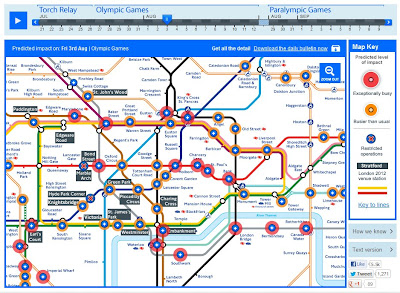 |
| Friday August 3rd is going to be busy! |
Services will generally start between 5-5.30am, but on Sundays they will start 30-45 minutes earlier than usual, at around 6.30am. This will vary by line and station.
The Tube and DLR will run around 60 minutes later than normal on all days. Last trains from central London will leave around 1.30am.
There’ll be extra evening services on the Jubilee, Central and District lines and more trains running in the late evening from Friday 3 August, when events start at the Olympic Stadium.
On certain days and at certain times of day during the Games, some stations will operate differently. Measures may include entry or exit only at some stations, one-way movement within the station or station closures at stations where capacity is not high enough to deal with the demand. These changes will be signed within the affected stations in advance.
On the Bakerloo, expect a lot more people especially when Wembley is in use. Baker Street station will inevitably be very busy as a major interchange.
The Met Line will also be exceptionally busy when Wembley is in use, and Finchley Road is another hotspot station.
Despite being a direct route to the Olympic Park, our stretch of the Overground has not been singled out as being a major bottleneck, although it will – like everywhere else – be busier than normal. Highbury & Islington in particular will be a busy interchange station.
Buses will run more frequently on many routes to cater for the additional passengers. However, some bus services will need to be temporarily diverted and some stops moved or suspended as a result of the road changes that will be in place.
Thankfully, our local bus routes are barely affected. The good ol’ C11 doesn’t even get a mention in TfL’s 86-page bus route report. The archery at Lords shouldn’t affect the 139, although it is likely to be slow going down Abbey Road/Lisson Grove, as it is when there’s a test match on. The 139 and 189 will also be allowed to turn right off Oxford Street onto Portman Square even though that little stretch is a Games Vehicles only route.
139: On Sunday 5th and Sunday 12th August, and Sunday 9th September, the 139 will terminate at Haymarket because of the marathons. This will be in place until Trafalgar Square reopens.
328: During the men’s and women’s road race (July 28th and 29th), the southbound 328 will terminate at the top of Earl’s Court Road, just off Kensington High Street. This will be in effect all day apparently. Initially, there had been plans to increase the frequency of the 328 generally to service Earls Court, but this is now believed to be unnecessary.
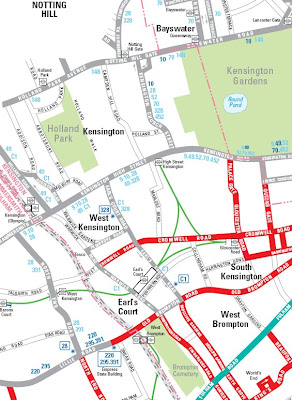 |
| The 328 will terminate in West Kensington during the road races |
Those of you who head up the Finchley Road, take note of two changes
113: At Marble Arch, the last stop and stand will be on Orchard Street as the Cumberland Gate bus stand will not be available from 20 July-15 August inclusive.
N113: Restrictions on Whitehall require amendments to out of service turning movements. From Cockspur Street, buses will run via Whitehall and Whitehall Place to stand on Northumberland Avenue and will return directly to Cockspur Street and the line of route. Expected to apply 20 July-15 August inclusive
National Rail services from London will operate later than normal. Last trains to locations within two to three hours of London will typically leave between midnight and 01:00. National Rail will also run longer and/or more frequent trains to and from most venue stations when events are taking place. Remember that Kings Cross St Pancras will be exceptionally busy as that’s where the Javelin trains to Stratford run to/from, and this will be one of the major routes people take to the Olympic Park. Expect lengthy queues.
Here’s what First Capital Connect says about Thameslink:
Trains already run throughout the night from Sunday to Friday on the Thameslink route so we have lengthened 34 of these per week out of London and added one new service on a Saturday night to get people home.
At the weekend we have also doubled in length the majority of our services that run between Wimbledon/Sutton and St Albans/Luton, as well as our Sunday services between East Croydon and Bedford. We have also extended four Sunday services beyond London to Bedford and Brighton.
We have ramped up train fleet maintenance at our depots to provide the extra services and we have cancelled all driver-training during the 2012 Games. We have special plans for the busiest stations we manage where there may be queueing systems. We’ll have over 1,000 additional shifts for customer facing roles. We have also increased our cleaning contract by 175 hours a day.
Oyster users will be charged only the minimum fare if they can’t touch out because of altered station arrangements.
Below are the estimated busy/very busy/extremely busy predictions for Thameslink trains in and out of London (click for full size).
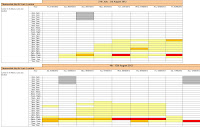 |
| Thameslink heading north out of London |
 |
| Thameslink heading south into London |
The Olympic Route Network doesn’t really affect us very much. Obviously any attempt to drive into central London means running into issues, but in our bit of NW London, the only issues are around Lords and Wembley, and in neither case is there anything too drastic to worry about. The ORN comes into place on Wednesday and runs right through to August 14th. Normal traffic can use the vast majority of the ORN, although there will be temporary changes such as suspended turns, stopping and loading restrictions, and traffic signal timing alterations. Stopping or parking on the ORN will result in a £130 penalty charge and your vehicle may be towed away.
These two maps and a reasonably good video give you some idea of what to expect.
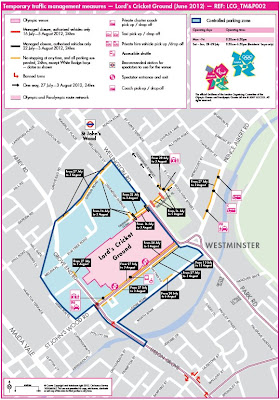 |
| Changes around Lord’s (venue for archery) |
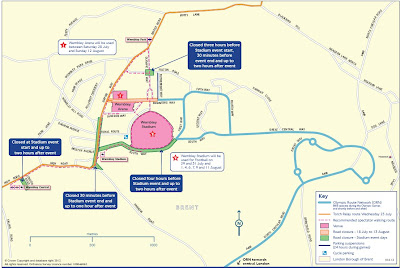 |
| Changes around Wembley Stadium |
Cycling around London may well be one of the best ways of getting around. Just one thing to note though – many of the central London Boris Bike hire stands will be suspended during the Games.
A few stats from TfL on what London is going to be coping with (and a pretty map showing numbers of spectators on Sunday August 5th)
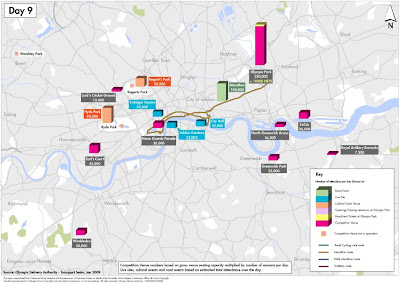 |
| Sunday 5th (click for full size) |
Up to one million extra visitors are expected in London every day during the Games. They will make an additional three million journeys, over and above the regular 12 million journeys made on public transport
During each of the 16 days of the 2012 Games, London will be transport an average of 500,000 spectators and around 55,000 members of the Games Family each day, including athletes and team officials, technical officials, press and broadcasting teams, Olympic and Paralympic families, and marketing partners.
Around 800,000 tickets are available on the busiest days (Friday 3 August for the transport network, although overall more tickets are available on Saturday 4 August) – 510,000 of which will be for London-based venues.


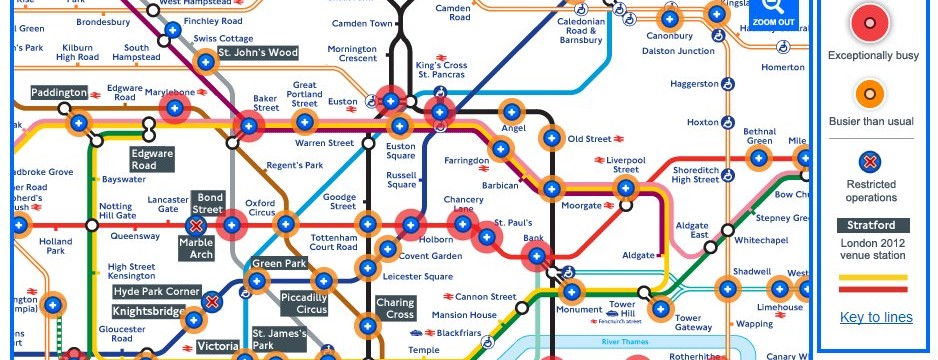
This is incredibly useful! I couldn't work out from the TFL site whether or not the 139 would be affected, but you've gone and done it for me! Thank you Lord Whamp, your generosity and wisdom know no bounds.
Thanks – Glad it's of use. It's true that details of specific routes/streets etc. are hard to come by. And even with all the TfL info it wasn't always obvious what was going on. Do let me know if the trusty 139 runs into any problems during the Games.
This is really helpful – many thanks. I had reached the same conclusion as you. It’s noticeable that at West Hampstead tube station the existing sign that has had Olympic Venues added does not show the Olympic Park. Instead the signs on the wall point to the station exit for the Olympic Park (and Earls Court). I assume they want people to use the Overground (where the entrance/exit space has just been made smaller) but there is no signage yet. As you say, Thameslink to connect to the Javelin is also a possiblity – the Javelin journey is covered by the Olympic Travelcard that comes with a ticket to a Games’ event but not by Oystercards or Passes. Some concerns have already been expressed about the likely queues at St Pancras for this service. Time will tell what announcements will be made at West Hampstead station and on trains arriving there – and of course what is likely be the best way to get to the various venues/work from here.